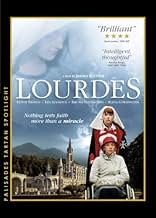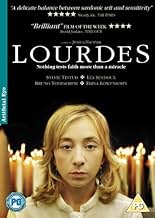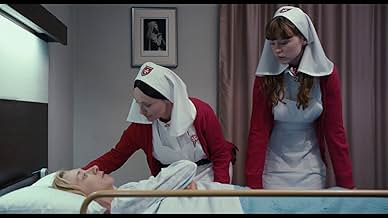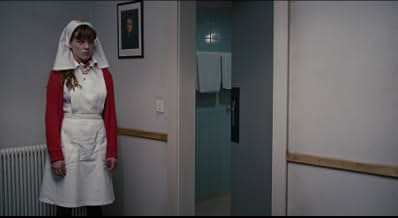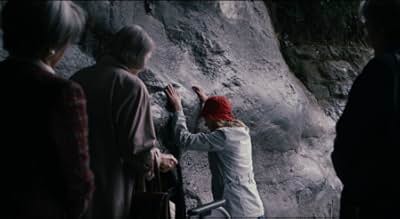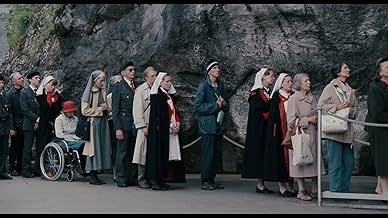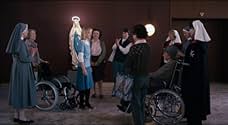IMDb RATING
6.9/10
3.9K
YOUR RATING
In order to escape her isolation, wheelchair-bound Christine makes a life changing journey to Lourdes, the iconic site of pilgrimage in the Pyrenees Mountains.In order to escape her isolation, wheelchair-bound Christine makes a life changing journey to Lourdes, the iconic site of pilgrimage in the Pyrenees Mountains.In order to escape her isolation, wheelchair-bound Christine makes a life changing journey to Lourdes, the iconic site of pilgrimage in the Pyrenees Mountains.
- Awards
- 12 wins & 7 nominations total
Orsolya Tóth
- Child in Wheelchair
- (as Orsi Tóth)
Gerith Holzinger
- Malteserin
- (as Gerith Alice Holzinger)
- Director
- Writer
- All cast & crew
- Production, box office & more at IMDbPro
Featured reviews
I am Roman Catholic. Lourdes is a blessed, mystical place. I hear. The story goes, the Virgin Mary appeared to St. Bernadette in a grotto near Lourdes several times. Word spread, a shrine was built, miracles occurred, all in this small community in the south of France. Now, millions travel to Lourdes every year, looking for intervention from St. Bernadette and the Blessed Mother. While I've never been there, I have been to shrines, like Saint Joseph's Oratory of Mount-Royal in Montreal. The relics for sale and presence of the pilgrims are a little scary, but there was no denying the power of the place. So, I was very interested to see a pilgrimage from the perspective of a pilgrim in Lourdes, a movie playing at the Cleveland International Film Festival, this week. Christine is a young woman from France who has multiple sclerosis. She's lost control of her body from the neck down. But, her mind is vibrant, she seems to accept the help of nurse volunteers at Lourdes with a pleasant demeanor. She tells a priest, in confession, that she gets angry over her diagnosis and feels envious of able bodied people, like a nurse who is flirting with a man on the trip that she fancies. This is like a group tour, with a different activity each day: a hike through the grotto, a bath in the water, even an award at the end of the trip for the "Best Pilgrim." Christine's mother is with her on the trip. Their relationship is one of the things that bothered me in the movie. While her mother accepts the role of caregiver, they barely talk or interact, except in a very distant fashion. I didn't get that. A couple of the older volunteers hang together at night and discuss deep topics of faith and spirituality. Juxtapose that with Christine confessing to her nurse that she is not really a believer, she just goes on the pilgrimages because she can't really get out of the house for much else. When the inevitable miracle occurs, within the group, some are jealous, others are skeptical, others just wonder why some are chosen and others are not. Lourdes is a very quiet, very slow moving film. I guess I was hoping for more of an epiphany, but at the end, I wasn't at all sure what I was supposed to take away from it. I was interested but not satisfied. I give Lourdes a 7 out of 10.
Pros:
1. Léa Seydoux (Maria), Sylvie Testud (Christine), and Elina Löwensohn (Cécile) give fantastically rich performances.
2. The film highlights how people will use faith differently. Whether it be as a hobby, as a way of coping, or as a way-of-life.
3. The cinematography is almost perfect. Everything from the lighting, the framing, and the long impactful shots are just incredible.
4. Cécile collapsing on the floor is legitimately heartbreaking as even though before she was mostly stern and stoic, it was obvious that she cared for the patients.
5. Christine finding the ability to walk again is genuinely uplifting, and her reaction really helps to ground the "miracle" as she milks the newly-found attention after being ignored for awhile. It also rams home the ending with blunt force.
Cons: 1. Some of the scenes last a little too long. 2. The audio, at times, is distractingly out-of-sync.
Cons: 1. Some of the scenes last a little too long. 2. The audio, at times, is distractingly out-of-sync.
That was George Martin's description of Lennon and Maccartney's songwriting partnership: Maccartney provided the olive oil, and Lennon the vinegar. The balance is just as perfect in this movie, which manages to capture the temple of crass which is Lourdes, without ridiculing the faith that leads people to revere it. It is a quiet movie, with little dialogue, and frequent recurring motifs—religious services, visits to the grotto, Lourdes water in ghastly containers. The little cast of characters is superb, and there are no weak performances here.
If I had one criticism, it's that the movie is sometimes too subtle for its own good. Occasionally, I like to be told what I'm watching and why it's significant. Perhaps this is my own crudeness. Nevertheless a brilliant movie, that made me chuckle and yet moved me.
If I had one criticism, it's that the movie is sometimes too subtle for its own good. Occasionally, I like to be told what I'm watching and why it's significant. Perhaps this is my own crudeness. Nevertheless a brilliant movie, that made me chuckle and yet moved me.
Summary
Lourdes is a remarkable psychological and social x-ray of the world around the famous religious complex in the Pyrenees, with that clinical precision so typical of Austrian cinema and with a delicate balance in which hints of irony always give way to respect and piety. The film achieves moments of an absolutely human, moving religiosity, such as I have rarely seen in a film.
Review:
Jessica Hausner's film follows Christine, a motor disabled person, during her journey through the famous tourist-religious complex around the Lourdes Grotto in the French Pyrenees.
Multiple dimensions and themes run through this film. On the one hand, there is a look at the disease, the relationship between the healthy and the sick and how she considers the Catholic religion to the sick and the concept of healing, put into the mouths of their own priests.
On the other hand, Lourdes paints a picture of that touristic-religious universe viewed with that clinical precision so typical of Austrian cinema, with a delicate balance in which hints of irony always give way to respect and piety. It is difficult at first to place oneself in that world of patients, companions, relatives, nuns, priests and volunteers of the Order of Malta (where each one fulfills a precise, transitory or permanent function), where a sociogram is drawn where solidarity intersects , misgivings, hope, desire, jealousy, envy, frustration and, of course, faith, in a setting that is enriched with real shots of masses and mass movements in which the film leans into the documentary . They all follow a kind of procession (with something of a way of the cross) scheduled and methodical, waiting for the miracle of healing to take place.
Why do the sick go to Lourdes? Christine answers that question early in the film, and not exactly from a pious place. Sylvie Testud remarkably puts the body to her character and her evolution, accompanied by Maria (Lea Seydoux, in a rather small role), the companion who embodies health.
As we had already seen in the also notable Little Joe, Hausner beautifully frames her scenes preferably in fixed and geometric planes. Supported by a wonderful use of Bach's music, Lourdes achieves moments of an absolutely human, moving religiosity, such as I have rarely seen in a film.
Lourdes is a remarkable psychological and social x-ray of the world around the famous religious complex in the Pyrenees, with that clinical precision so typical of Austrian cinema and with a delicate balance in which hints of irony always give way to respect and piety. The film achieves moments of an absolutely human, moving religiosity, such as I have rarely seen in a film.
Review:
Jessica Hausner's film follows Christine, a motor disabled person, during her journey through the famous tourist-religious complex around the Lourdes Grotto in the French Pyrenees.
Multiple dimensions and themes run through this film. On the one hand, there is a look at the disease, the relationship between the healthy and the sick and how she considers the Catholic religion to the sick and the concept of healing, put into the mouths of their own priests.
On the other hand, Lourdes paints a picture of that touristic-religious universe viewed with that clinical precision so typical of Austrian cinema, with a delicate balance in which hints of irony always give way to respect and piety. It is difficult at first to place oneself in that world of patients, companions, relatives, nuns, priests and volunteers of the Order of Malta (where each one fulfills a precise, transitory or permanent function), where a sociogram is drawn where solidarity intersects , misgivings, hope, desire, jealousy, envy, frustration and, of course, faith, in a setting that is enriched with real shots of masses and mass movements in which the film leans into the documentary . They all follow a kind of procession (with something of a way of the cross) scheduled and methodical, waiting for the miracle of healing to take place.
Why do the sick go to Lourdes? Christine answers that question early in the film, and not exactly from a pious place. Sylvie Testud remarkably puts the body to her character and her evolution, accompanied by Maria (Lea Seydoux, in a rather small role), the companion who embodies health.
As we had already seen in the also notable Little Joe, Hausner beautifully frames her scenes preferably in fixed and geometric planes. Supported by a wonderful use of Bach's music, Lourdes achieves moments of an absolutely human, moving religiosity, such as I have rarely seen in a film.
A girl with MS can't move her body, except for the face muscles. She goes to Lourdes, the place of miracles. She's not just tired of her life, she's of course also envious about life of others.
Usually, it's obvious there on the screen you shall look. Not here. Long takes, many extras, everybody make their moves and everybody is interesting, although you may forget them for a while, watching others.
Quietly, so many believable emotions are to be found here. Jealousy, slight passion, hopes, disappointments. And after a while you're not watching, you're among these pilgrims, and although you've never been in this environment, you recognize everything. And Sylvie Testud is superb.
Usually, it's obvious there on the screen you shall look. Not here. Long takes, many extras, everybody make their moves and everybody is interesting, although you may forget them for a while, watching others.
Quietly, so many believable emotions are to be found here. Jealousy, slight passion, hopes, disappointments. And after a while you're not watching, you're among these pilgrims, and although you've never been in this environment, you recognize everything. And Sylvie Testud is superb.
Did you know
- TriviaWhen the script for Lourdes (2009) first landed on Sylvie Testud's desk, her initial reaction was that she didn't want to do anything that might involve her playing a nun or taking easy potshots at religion. She instantly changed her mind after reading the script.
- ConnectionsFeatured in Women Make Film: A New Road Movie Through Cinema (2018)
- How long is Lourdes?Powered by Alexa
Details
- Release date
- Countries of origin
- Official sites
- Language
- Also known as
- 奇蹟度假村
- Filming locations
- Production companies
- See more company credits at IMDbPro
Box office
- Budget
- €2,000,000 (estimated)
- Gross worldwide
- $2,947,270
- Runtime
- 1h 36m(96 min)
- Color
- Sound mix
- Aspect ratio
- 1.85 : 1
Contribute to this page
Suggest an edit or add missing content


